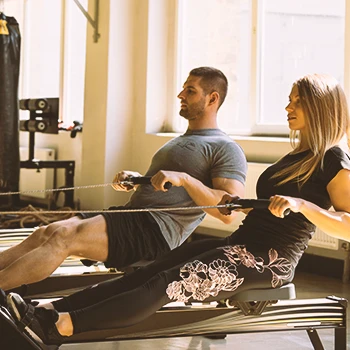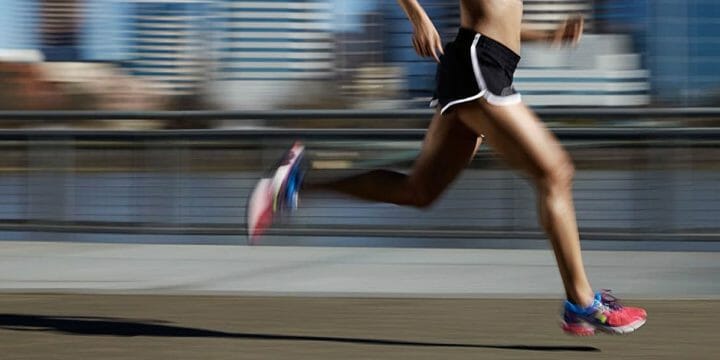As a certified fitness coach, I always encourage my clients to add running to their training routine for endurance, muscle strength, and losing stubborn fats.
But a few months ago, while researching other benefits of running, I came across the notion that it can elevate testosterone levels.
So, I took a few weeks to research the topic and understand how running boosts testosterone levels.
Keep on reading to see what I found out.
Quick Summary
- Running can increase testosterone levels, particularly through high-intensity activities like sprinting.
- However, excessive or prolonged running, especially at a lower intensity, may lead to a decrease in testosterone levels due to increased cortisol production.
- Athletes who performed four 250-meter sprints at 80% of their maximum speed experienced a significant increase in their testosterone-to-cortisol ratio.
- Personally, I've found that balancing running with strength training offers the most effective way to enhance testosterone levels and overall fitness.
What Is Testosterone?

The National Institute of Health (NIH) states testosterone, primarily produced by Leydig cells in the testicles, is key in developing male sexual characteristics, sperm production, and fertility [1].
While testosterone is mainly a male hormone, it's also present in females in smaller amounts.
Besides sperm synthesis, it regulates various processes in males.
These include:
- Sexual drive
- Bone mass
- Distribution of fat
- Muscle mass and power
- Production of red blood cells
"When the levels of testosterone are at their highest, you have more energy, heart health benefits, improved attitude, memory, and sex drive. You have bone strength and lean muscle mass as well."
- Dr. Noel Young, MD
Testosterone and Infertility
Men become infertile when their testosterone levels are insufficient. This, according to NIH, is because testosterone aids in the maturation of sperm [2].
Though testosterone is a hormone associated with males, it also plays a role in women's sexual desire, bone density, and muscular strength.
However, NIH notes that too much testosterone can also lead to infertility and female pattern baldness [3].
Does Running Boost Testosterone Levels?

From my personal experience, incorporating running into my routine definitely seemed to boost my testosterone levels. I noticed a particular increase when I focused on brief, high-intensity sprints.
A study in the National Library of Medicine showed athletes running four 250-meter sprints at 80% max speed with three-minute breaks significantly increased their testosterone-to-cortisol ratio and testosterone levels [4].
This research indicates sprinting, a form of high-intensity interval training (HIIT), triggers an anabolic response akin to strength training.
More muscle mass from such exercises leads to higher testosterone production.
Can Running Negatively Impact Testosterone?

Running can sometimes lower testosterone levels, depending on the type and intensity.
In my journey, I've learned that while long, steady runs are great for cardiovascular health, they don't boost testosterone like intense runs do.
Extended and frequent endurance running may lead to reduced testosterone due to increased cortisol, the body's stress response hormone.
It's important to find a balance between different running styles to maintain optimal testosterone levels.
The Cortisol Hormone
According to NIH, cortisol levels are known to impair your body's capability of producing serum testosterone [5].
Data from research by NIH with male endurance athletes discovered that a long continuous run on a treadmill for 97 minutes at 75% of the participant’s maximal speed generated a substantial drop in free testosterone levels [6].
This reduction lasted for 72 hours following the workout session.
In short, continuously training in a way that depletes testosterone without enough recovery may result in a chronic condition of low testosterone.
Other Exercises That Increase Testosterone

The multi-joint exercises are also excellent for testosterone-boosting as they activate the body's major muscle groups.
Let’s take a look at some of these exercises in detail.
Resistance Training
"Weight" or "endurance training" involves challenging muscles against resistance.
This can be done using gym equipment, free weights, resistance bands, or body weight.
Beyond obvious benefits like muscle building, fat loss, and improved endurance and flexibility, it also boosts testosterone levels.
A study by the National Center of Biotechnological Information found that men who engaged in weight training thrice weekly for a month experienced a significant increase in testosterone levels [7].
High-Intensity Interval Training (HIIT)

HIIT involves short, intense activity bursts followed by recovery or lighter exercises.
It's known to burn fat, enhance muscle growth, and boost testosterone in some individuals.
A 2012 NIH study compared HIIT with steady-state endurance (SSE) exercises. Participants doing 45-minute continuous runs had lower testosterone increases than those alternating between high-intensity sprints and easy jogs every 90 seconds [8].
Leg Workouts
While it's easy to imagine that having more testosterone means having a lot of biceps (and inversely), this doesn't imply you should only practice upper-body workouts.
One research by the National Institute of health divided individuals into two groups: arm-only workouts and leg-and-arm workouts.
Results demonstrated that testosterone production was much greater in those who activated both their upper and lower bodies [9].
I combine sprinting with my endurance training to further raise testosterone levels in my body.
Tips for Naturally Boosting Testosterone Levels

You need more than just running to increase your testosterone levels.
Adopting lifestyle choices that can enhance general health and well-being is the greatest natural way to boost low testosterone levels.
Below are some tips on how to naturally boost your testosterone levels:
- Consume a diet heavy on proteins, fat, and carbohydrates.
- Reduce your anxiety and cortisol levels.
- Get some vitamin D from the sun, or use vitamin D pills.
- Get seven to eight hours of sleep every night.
- Consider botanicals such as ashwagandha, ginger, and horny goat weed.
- Avoid compounds that might boost natural estrogen, such as bisphenol A (BPA), in males.
If natural remedies do not relieve your symptoms, consult a doctor regarding the best options to increase your T levels.
In addition, I recommend incorporating only these natural testosterone boosters into your daily regimen.
Related Articles:
Benefits of Increased Testosterone
- Muscle growth and strength: Higher testosterone boosts muscle protein synthesis, aiding in lean muscle development, crucial for strength training enthusiasts to enhance athletic prowess and everyday fitness.
- Fat reduction and body shape: Increased testosterone levels aid in lowering body fat by enhancing metabolism and lean tissue growth, beneficial for weight control and overall health.
- Bone health: Testosterone strengthens bone density, vital for minimizing osteoporosis and fractures in the elderly, promoting long-term skeletal wellness.
- Mood and mental clarity: Adequate testosterone improves mental health and concentration, countering depression and cognitive issues. Enhancing testosterone levels can uplift mood and sharpen cognitive functions.
- Sexual well-being: Testosterone significantly influences sexual health, impacting libido and erectile function. Maintaining balanced testosterone is essential for a robust sex drive and reproductive health, boosting sexual fulfillment for both sexes.
FAQs
Which Exercise Increases Testosterone Most?
The exercise that increases testosterone the most is strength training, like weight lifting. It offers both short- and long-term effects on testosterone production.
Does Cardio Increase Testosterone?
Yes, cardio may increase testosterone levels. It may help boost your metabolism, thus burning fat and increasing your T levels.
Does Training Legs Increase Testosterone?
Yes, training your legs may increase testosterone. It can also lead to human growth hormone (HGH) production, which improves fat metabolism, endurance, and muscle building.
References:
- https://www.ncbi.nlm.nih.gov/books/NBK526128/
- https://www.ncbi.nlm.nih.gov/books/NBK562258/
- https://www.ncbi.nlm.nih.gov/books/NBK526128/
- https://pubmed.ncbi.nlm.nih.gov/19057403/
- https://pubmed.ncbi.nlm.nih.gov/12665985/
- https://pubmed.ncbi.nlm.nih.gov/27262888/
- https://pubmed.ncbi.nlm.nih.gov/17051372/
- https://pubmed.ncbi.nlm.nih.gov/23310924/
- https://pubmed.ncbi.nlm.nih.gov/11782267/
About The Author
You May Also Like






